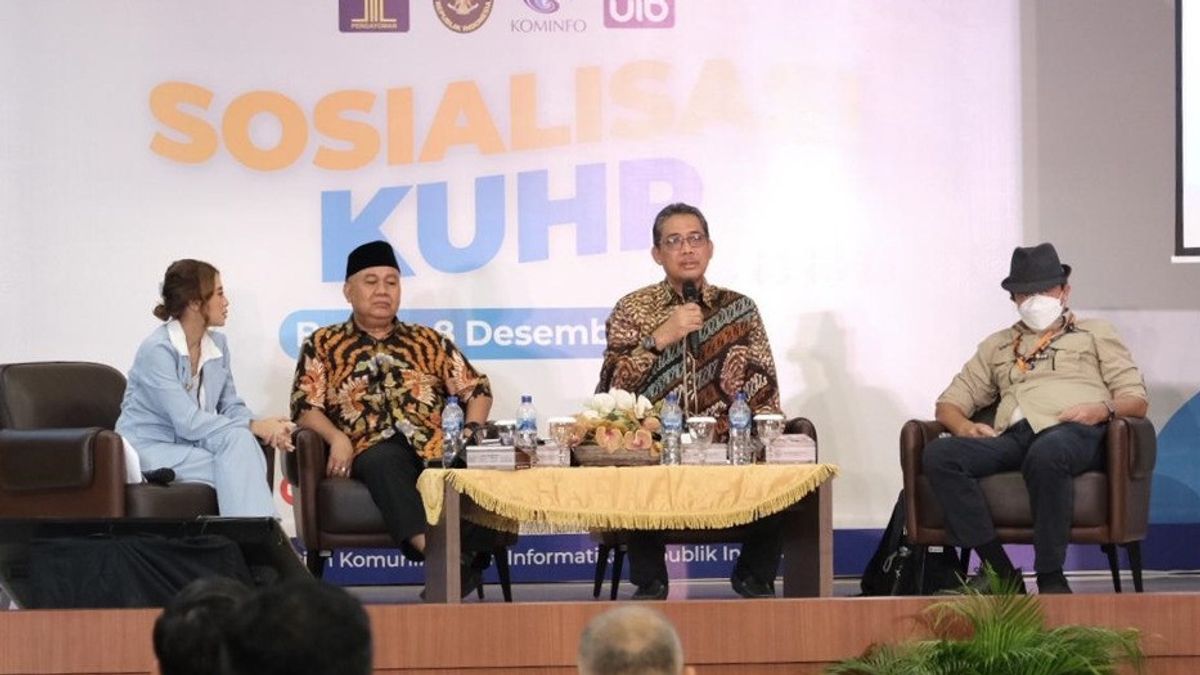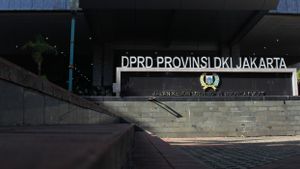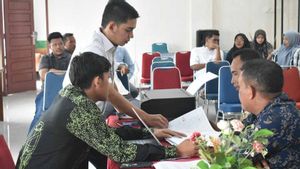JAKARTA - The government, through the Ministry of Communication and Information (Kemenkominfo), has re-socialized the Criminal Code (KUHP) which was ratified by the Indonesian House of Representatives (DPR RI) on December 6, 2022 yesterday.
The Ministry of Communication and Information through the Directorate General of Public Information (Ditjen) IKP held activities to socialize the Criminal Code in various regencies/cities in Indonesia. One of them is collaborating with Batam International University to increase understanding in order to obtain wider public support.
Director of Information and Communication of Political, Legal and Security Affairs, represented by the Head of the Legal Information and Communication and Human Rights Team, Filmon Leonard Warouw, in his speech said that the national legal system update or the Criminal Code was carried out openly and involved various parties, practitioners, academics, experts, students, NGOs, and the public of course.
"This update aims to decolonialize, harmonize, and to adjust the conditions of the times and dynamics in society," he said.
He revealed that there is still a lot of disinformation about the Criminal Code, for that we need to know more and adapt and understand the essence of this new Criminal Code.
Previously, the event had been opened by a speech from the Chancellor of Batam International University, Iskandar Itan, who said that the government was currently trying to explain the legalized Criminal Code. Even though it has absorbed many aspirations, the ratification of it certainly cannot be separated from various criticisms.
"However, we must be grateful that at the end of this we already have our own new Criminal Code, and if necessary there is something to fix let's work together and fix it together," he explained.
Starting the socialization session, Professor of the Faculty of Law, Semarang State University, Benny Riyanto, said that the ratification of the Criminal Code was a big momentum for all Indonesian people. Because, we have succeeded in replacing colonial legal products into original monumental legal products of the Indonesian nation.
The RKUHP has indeed been ratified, but the Criminal Code itself has a transition process or transitional rules. So, this transition period must first be carried out for approximately three years. The hope is that for these three years it is enough to form a law for both the DPR and the government to prepare so that our Criminal Code can be implemented as a whole, and can socialize it to the wider community," explained Benny.
According to him, socialization to the community is important in this transitional three-year period. However, the process was conveyed by Benny not easily, because it requires hard work from law enforcers and lecturers, especially those who teach criminal law.
"We have to work hard, because so far the grip of law enforcement and criminal lecturers is the Criminal Code of Dutch colonial heritage, therefore socialization is needed to provide an understanding of the new Criminal Code. For this reason, we must be able to adapt to this progress and always have a positive view, "explained Benny.
In the next session, the Academician of the Faculty of Law, University of International Batam, Ampuan Situmeang revealed that Article 2 of the Criminal Code explains that the laws that live in society are related to unwritten laws that still apply and develop in the lives of Indonesian people.
This is something that becomes controversial but this is democracy. What needs to be socialized is that the law that lives in society and is regulated in the Criminal Code, will still be regulated in regional regulations. And this regional regulation is a way to establish the laws that live in society itself, "said Ampuan.
According to Ampuan, in the future, it is our job to monitor especially academics in observing how the Criminal Code has been ratified. He also said that the laws contained in society were actually established through the mechanisms of the Regional Regulation (Perda), so there is an overview of the laws that live in society what the procedures for its determination are.. On the same occasion, Professor of the Faculty of Criminal Law, Diponegoro University, Pujiyono, said one thing that must be understood first that in the law the point is there are norms and values. Normas are formed because there is an underlying value basic idea.
"What about the existence of our Criminal Code? As we all know, the Criminal Code is a colonial heritage product, which of course from the basic idea is certainly different from the basic idea that is literate, used in the context of social life in Indonesia," he explained.
Pujiyono also gave an example of a sexual violence case he had handled. Where an act that in the new Criminal Code is considered a disgraceful crime, but according to the old Criminal Code it is not a criminal act. The reality is, what is called a criminal act is not solely what is later included in the law. So there are still many actions that are called criminal acts, but are not accommodated in the law. This is one reason why the Indonesian nation needs to reform the Criminal Code.
According to him, if the basic idea of the Criminal Code is studied more deeply, then the Criminal Code of Dutch colonial heritage is based on individual liberalism values, while the Indonesian people are mostly based on monodualism aspects, or how to place individuals in social contexts.
The hybrid socialization of the Criminal Code has been attended by around 300 online and offline participants. The hope is that this socialization can be a means of socializing the discussion related to the adjustment of the Criminal Code Bill to public elements.
In addition, this socialization is also expected to increase public understanding of the importance of adjusting to the Criminal Code so that it is more in accordance with the current dynamics of the community and encourages public participation to support the adjustment of the draft KUHP Bill until it is ratified into the new Criminal Code Law.
The English, Chinese, Japanese, Arabic, and French versions are automatically generated by the AI. So there may still be inaccuracies in translating, please always see Indonesian as our main language. (system supported by DigitalSiber.id)













